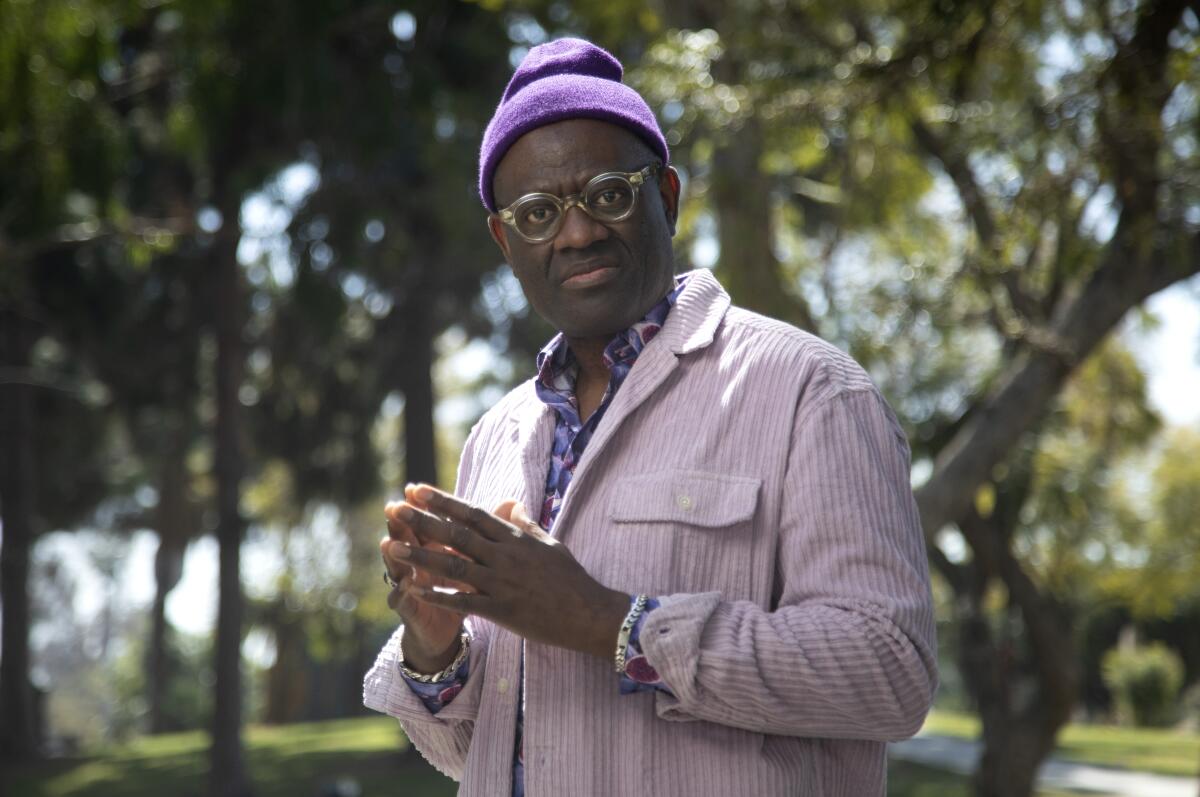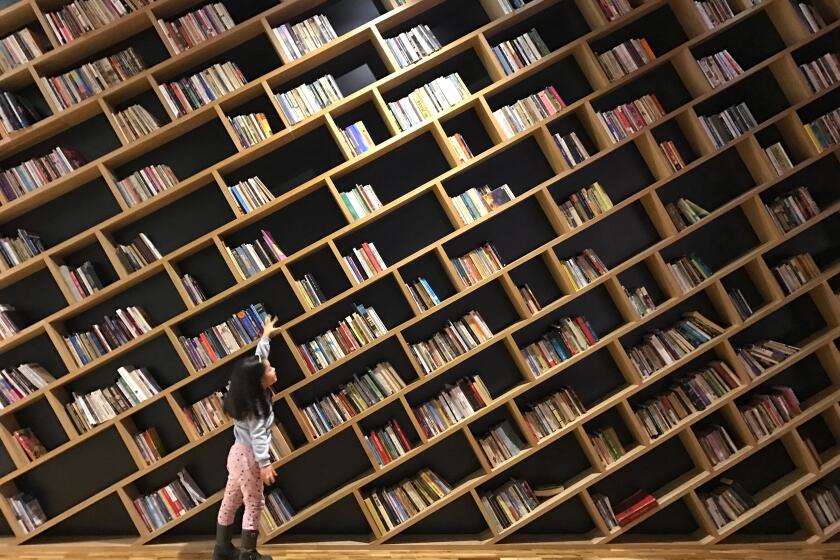Amanda Gorman brings the representation debate to the small world of book translation

- Share via
One of the more unexpected twists of an unprecedented year is that the little-known business of literary translation has become a source of public controversy.
It began in mid-January with an uncontroversial choice — the selection of Amanda Gorman, a then-22-year-old Black poet, to read at Joe Biden’s presidential inauguration. Gorman’s inaugural poem, “The Hill We Climb,” was a rousing success, a stirring call to the unfinished business of American democracy after an attack on the U.S. Capitol. Penguin Random House snatched up the poem for publication, and foreign publishers clambered to publish it abroad, which meant enlisting translators worldwide.
Last month, two of those translators ceased work on the project. — first in the Netherlands, after criticism that a white author had been chosen to translate the work of a Black woman. Dutch translator Marieke Lucas Rijneveld, who last year became the youngest writer to win the International Booker Prize, handed back the assignment. Most recently, Catalan translator Victor Obiols was removed from the job.
“They have told me that I am not suitable to translate it,” Obiols told the Agence France-Presse news agency March 10. “They did not question my abilities, but they were looking for a different profile, which had to be a woman, young, activist and preferably Black.”
Some see the debate over “The Hill We Climb,” out this month in the U.S. and expected to sell millions of copies worldwide, as an opportunity to interrogate literary diversity everywhere. Others say world literature wouldn’t have spread without white translators and ask that we judge the translation, not the translator. Still others worry about the ethics of pressing U.S. notions of race on foreign readers.
Online, the usual battle lines are being drawn. Thomas Chatterton Williams, who tweets frequently about what he considers overreaction on the left, called the change in translators “an international moral panic.” Obiols recently told Spain’s ABC newspaper that he was “banned.” He suggested that to get another contract, “I will have to look for bitumen,” a material used for blackface.
She became the national youth poet laureate at age 16; six years later, she read her poem at Joe Biden’s and Kamala Harris’ historic swearing-in.
(Representatives for Obiols and Gorman did not respond to interview requests; Rijneveld declined to comment.)
Such debates are uncommon in this specialized field. “The translation world doesn’t tend to have many large controversies like this,” noted Aaron Robertson, a writer, translator and editor at Spiegel & Grau. “It’s always extremely surprising for us when it’s thrust into the middle of a larger spotlight.”
Yet it makes sense at a time when so many institutions are being scrutinized. Conversations about representation and inequities in many industries, including book publishing, gathered momentum after last summer’s police brutality protests. And now the field of translation — which remains overwhelmingly white — is having its own reckoning.
The course of that reckoning is familiar: social media backlash leading to institutional reversal. Last month, after the Dutch publishing house Meulenhoff announced Rijneveld as the translator, journalist and activist Janice Deul led social media critics with an opinion piece in de Volkskrant newspaper calling the choice “incomprehensible” and a missed opportunity to hire someone like Gorman — “a spoken word artist, young, a woman and unapologetically Black.”
It was a Dutch author, young-adult writer Corinne Duyvis, who in 2015 coined #OwnVoices, the hashtag advocating that stories about marginalized people be written by authors who share the same identity and experiences. The idea was much debated in young-adult circles before reaching adult trade publishing with the controversy over Jeanine Cummins’ bestseller “American Dirt” — a thriller about Mexican refugees written by a white American. Now it has reached international publishing.
“As far as I know, American publishers have not historically used the background of the author and translator as part of their calculus when deciding who is going to work on the book,” said Chad Post, publisher of Open Letter Books, a nonprofit translation press. “That’s not to say these conversations aren’t valid or shouldn’t be happening. And it will make more sense with certain projects than with others.”
The #OwnVoices movement brings special challenges to translation — a job that is inherently about making work accessible to audiences different from the author. Is the act of translation also an extension of a particular identity? Is the experience of a person of color in Holland analogous to that of an African American?
The national youth poet laureate read her galvanizing poem, ‘The Hill We Climb,’ just after Joe Biden was inaugurated as the 46th U.S. president.
There is also the relatively limited pool of translators; finding someone to do a job for modest pay that requires expert fluency in at least two languages can be hard enough. Adding identity further complicates the search.
Nonetheless, debates on translating works across race or identity are not new. “When people have to translate books from the 1920s that use very loaded terms, and you have characters that are racist or using derogatory terms, that gets to be a tricky issue,” said Post. “How do you deal with that?”
Identity is one factor. Lawrence Schimel, an author and translator, brings up a Spanish translation of his own work by a straight man who “made biased, wild assumptions” based on ignorance of gay subculture. “He didn’t know the word ‘leather queen’ and instead of finding out what it meant, he used ‘paganos’ (pagans) because the characters were dressed in leather and engaging in ‘ritual’ activities.”
Schimel then offered a counterexample: Another straight man, while translating a story of Schimel’s into German, called a gay sex chat line to ensure that there wasn’t a gay slang term for sex he didn’t know about. “The publisher reimbursed him” for the chat, Schimel said, “since he had put in the legwork to do his job right.”
Post believes there are certain titles for which identity makes a difference — for instance, memoirs about motherhood or sexual assault. “Having those translated by a generic white guy is viscerally irritating,” he said, “and isn’t dissimilar from the emotions people are having in the Gorman situation.”
Fostering real diversity
The ability to find the right translator for any book depends on the depth — and diversity — of the field. According to a recent survey by the American Literary Translators Assn. (ALTA), 73% of the translator community is white, 11% is Asian, 10% is Hispanic/Latino, 4% is Middle Eastern/North African and 2% is Black.
The association has taken steps in recent years to address the industry’s lack of diversity. It has conducted outreach to historically Black colleges and other organizations to broaden the diversity of its conference attendees; created the ALTA Equity Advocates and BIPOC Caucus committees; launched the Peter K. Jansen Memorial Travel Fellowship for an “emerging translator of color or a translator working from an underrepresented diaspora or stateless language”; and ensured that more people of color are included in its programming.
“A lot of people are very hopeful for the future of diversity efforts like these; I’m still in the wait-and-see-box,” said Miki Turner, a photojournalism professor at USC and founder of the Annenberg Cross-Cultural Student Assn.
“We had this big wave of diversity efforts in the ‘80s and the early ‘90s that worked for a while, and then they went away,” she said. “It’s just like the entertainment industry. It’s all very cyclical. We have all these mandates of ‘More minorities in movies and shows,’ and they create an ensemble cast with the Black person and the Asian person, and they essentially say nothing but they’re on-screen, and they call it diversity.”
Real diversity in the field of translation would have to run deeper than in other industries to foster true representation — to ensure that, say, a Black woman in her 20s would be available to translate poetry from English to Catalan.
Regina Brooks believes there is a lot of talent out there, if publishers know where to find it. The founder and president of Serendipity Literary Agency, Brooks calls the idea that there aren’t enough diverse potential translators “absolutely ridiculous … There are all sorts of things that can be done. The translation community just has to identify what’s going to work for them.”
#PublishingPaidMe shows, in part, how arbitrary book advances are. But that guesswork isn’t the problem; it’s the executives doing the guessing.
Getting your foot in the door often comes down to luck and privilege, as Robertson, the Spiegel & Grau editor, can attest. He received scholarships to an elite high school, followed by Princeton and Oxford universities. “I was learning how to navigate these exclusionary spaces. … I knew what questions to ask, and I knew where to look,” he said. “But to even be here, as a Black translator and as someone who works at a well-respected publishing house, I’m sort of the exception to the rule.”
The debate comes down to opportunity, he added: “The people who are asking for Black women to translate Amanda Gorman’s work, they are looking not at the unifying task of translation as pure art, but they are asking, ‘Why do we turn to certain translators and not others?’”
It’s a valid question, but Robertson worries that it distracts from the larger task at hand — building pipelines among the publishing world and communities that don’t have access to it. That could mean opening up access to universities with robust language departments and expanding opportunities for student translators, many of whom can’t afford to accept unpaid internships in publishing.
In a statement released Monday, ALTA said patterns of “discrimination in education and publishing... make it harder for these translators to access opportunities comparable to those available to their white counterparts, not to mention that the criteria for these opportunities have historically been defined in white-centering ways.
“It is damaging to literary translation as a profession and as a practice when persistent and pervasive inequality of access still exists for so many potential practitioners.”
Is translation appropriation?
It’s notable that such systemic questions should arise from a situation as unusual as Gorman’s. Typically, foreign rights to a book’s publication are “subrights,” usually owned and sold (as in Gorman’s case) not by the American publisher but the literary agent. The international publisher then decides on the translator in consultation with the author and agent. Sometimes the writer has suggestions. Other times (as in Gorman’s case, according to Dutch publisher Meulenhoff), agents require foreign publishers to hire sensitivity readers tasked with finding biases, racism, stereotypes and misrepresentations in translations.
Major authors have some discretion, but many writers are fortunate to be translated at all. Between 550 and 650 works of fiction and poetry in translation are published in the U.S. every year, according to Post, who tracks the numbers in the Translation Database. Only roughly 80 of those books are poetry.
“Authors have a limited amount of power in their careers,” said one publishing industry journalist, who asked to remain anonymous while discussing sensitive issues. “Gorman’s fame has given her more say than most. So insisting on a translator who is young, female, an activist and if possible Black, she’s giving herself leverage which she might never have again. … She’s using that platform to foster or foment the values she believes in.”
The question of whether those values can or should apply to all translations is likely to be debated for a long time. Even some Black writers are wary of a translation system governed by an #OwnVoices ethos.
Alain Mabanckou, a widely translated French Congolese writer and professor at UCLA, believes that vetting a translator’s national or ethnic origin is a form of “discrimination” and “racism.”
“One simply cannot fight against exclusion by reinventing new ways of marginalizing people,” Mabanckou said in an email, “for this would ultimately lead to a situation whereby one could only understand or speak for people who are assumed to be like us.”

As an example, Mabanckou cites two major influences on his work, Toni Morrison and Maya Angelou — translated by white women into his native French.
“When the only way of looking at the world is through the lens of identity politics, then we have moved into a space that is contrary to what literature is about,” he said. “Literature is destined to liberate us, to change the way in which we see the world and to transport readers on previously uncharted adventures, to delineate the contours of a world in which fear gradually recedes into the background and the ‘other’ is invited into our hearts.”
Celebrities endorsed ‘American Dirt’ — then the reactions on Twitter turned negative. Cries of appropriation — and barb-wire dinner pieces — spark scorn for book
Some writers have addressed the question of whether it’s OK to write about another group by answering that it requires careful work to do well. Schimel said the same applies to translation.
“I made a personal commitment years ago to make sure I translate at least one writer of color per year, as a way of using my privilege to try and effect change,” Schimel said. “Can people translate writers with vastly different experiences than their own? Obviously, but also with obvious variations in how good a job they’ll do, based on their arrogance and assumptions in treating the work and the amount of effort they expend to unlearn their ingrained prejudices.”
Brooks, the literary agent, is more concerned about finding translators who aren’t privileged in the first place.
“No one is saying at this point that white translators are not going to continue to get jobs or opportunities, because that’s always going to be the case,” she said. “But the question is: Is there room at the table for more voices? For opportunities for other voices? My point on that is that yes. Yes, there are.”
More to Read
Sign up for our Book Club newsletter
Get the latest news, events and more from the Los Angeles Times Book Club, and help us get L.A. reading and talking.
You may occasionally receive promotional content from the Los Angeles Times.










